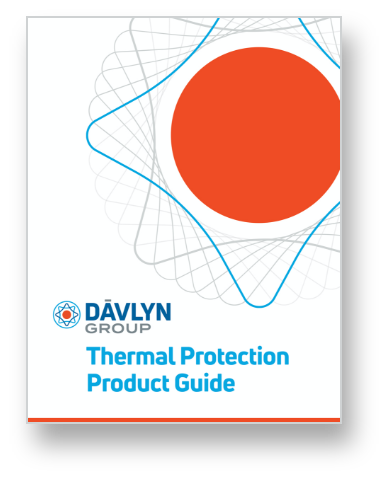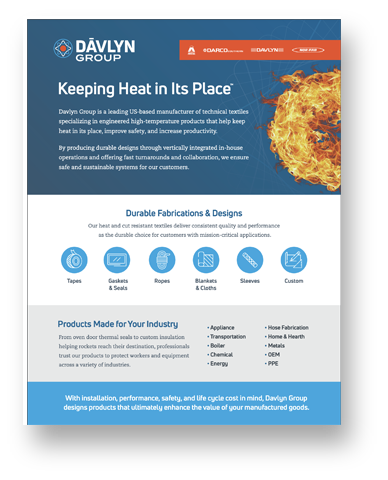Energy efficiency is a critical performance metric in industrial settings where thermal processes drive production. Whether it’s a power plant, metal foundry, or chemical processing facility, any system operating at high temperatures must control heat loss to run efficiently and safely.
High-performance industrial insulation materials like ropes, tapes, sleeves, gaskets, and seals are essential to retaining heat, improving process stability, and minimizing unnecessary energy consumption. By reducing the workload on heating systems and preventing thermal leaks across equipment and infrastructure, industrial insulation directly contributes to more reliable operations and lower energy bills.
But its value doesn’t end with energy savings. Industrial insulation also plays a vital role in maintaining safe working environments, extending the life of expensive equipment, and meeting increasingly stringent compliance standards.
Let’s explore how proper insulation improves thermal performance, protects assets, and supports facility operations across a wide range of industries.
How Industrial Insulation Reduces Energy Waste
Thermal energy is one of the most expensive resources industrial facilities manage. But without proper insulation and thermal management, it’s also one of the easiest to lose. Heat that escapes from processing lines, pipes, ovens, or mechanical systems doesn’t just affect temperature control. It reduces efficiency, drives up fuel consumption, and shortens equipment life. Industrial insulation helps address these issues at the source, giving facilities a straightforward path to reclaiming wasted energy.
Containing Heat to Improve Thermal Efficiency
Maintaining consistent process temperatures is essential to efficient facility operations. Without adequate insulation, thermal losses from key areas, such as furnace doors, curing ovens, and exhaust ducts, can result in prolonged warm-up times and higher energy requirements.
Textile-based solutions like ropes, sleeves, and tapes withstand extreme temperatures while reducing surface heat loss. These materials create thermal barriers that contain heat where it’s needed most, improving control and reducing the workload on heating systems. The result is more stable operations, reduced variability in thermal-sensitive processes, and better overall thermal efficiency.
Minimizing Heat Loss with Industrial Pipe Insulation
Pipes, boilers, and steam lines are among an industrial facility’s most common sources of energy loss. As heated fluids or gases travel through uninsulated or poorly sealed systems, they shed thermal energy into the environment, wasting both heat and money.
By applying high-performance industrial pipe insulation like wraps, tapes, and seals to these systems, facilities can retain more of the energy they generate. Gaskets and high-temperature seals at connection points also prevent hot air leaks and keep systems running within optimal thermal ranges. These measures are significant in facilities with long piping runs or frequent thermal cycling, as they help reduce fluctuations and maintain operational consistency.
Reducing Energy Consumption in High-Temperature Operations
High-heat industrial operations such as metalworking, chemical manufacturing, and power generation demand a significant energy input to maintain process temperatures. Every degree of heat that escapes increases that burden.
Properly applied industrial insulation reduces the strain on heating systems by limiting how much thermal energy escapes into the surrounding environment. This lowers the energy required to maintain operations and improves equipment efficiency for burners, heaters, and exchangers. In applications where extreme heat is the norm, insulating thermal barriers are essential to reducing fuel use, conserving resources, and protecting long-term profitability.
The Benefits of Industrial Insulation for Facility Operations
Reducing energy waste is just the beginning. Once insulation is in place, its long-term impact reaches nearly every facet of facility operations, from energy bills and maintenance schedules to worker safety and regulatory compliance. High-temperature textiles offer a practical way to protect your operation while improving its bottom line.
Cutting Energy Bills by Improving System Efficiency
Industrial facilities spend significant capital on the energy required to maintain high process temperatures. Without proper insulation, much of that investment escapes into the surrounding environment. Facilities can significantly reduce fuel and electricity usage by insulating equipment, pipes, and enclosures with heat-resistant textiles.
According to the U.S. Department of Energy and the National Insulation Association, mechanical insulation upgrades across industrial and commercial facilities could deliver an estimated $4.8 billion in annual energy savings by reducing thermal losses and improving system efficiency.1
Even modest improvements in thermal efficiency can lead to meaningful cost savings over time. Insulation provides a passive, low-maintenance solution that delivers long-term financial impact without requiring major system redesigns or ongoing energy input.
Preventing Costly Equipment Failures & Downtime
Heat is one of the most damaging forces industrial equipment faces. Prolonged exposure to high temperatures accelerates wear, weakens components, and increases the risk of unplanned shutdowns. Proper insulation acts as a thermal buffer, shielding equipment from stress and maintaining stable conditions that support reliable operation.
Seals and gaskets are critical in this context. When they degrade, systems lose both thermal control and operational integrity. High-temperature sealing solutions from Davlyn Group help ensure a secure fit in the most demanding environments, minimizing the risk of heat-related failures and reducing the frequency of costly maintenance events.
Extending the Lifespan of Industrial Equipment
Investing in insulation is also an investment in asset longevity. Repeated thermal cycling, where equipment heats up and cools down, can cause structural fatigue, material degradation, and premature failure. High-performance insulation reduces the intensity of these cycles by keeping surfaces closer to a consistent temperature.
Additionally, specialized textile insulation resists corrosion, abrasion, and chemical exposure, all common challenges in industrial environments. These materials help protect sensitive equipment from internal and external threats, extending service life and preserving capital investments.
Workplace Safety & Regulatory Compliance
Safety is non-negotiable in industrial environments. Uninsulated surfaces that operate at high temperatures pose serious risks to personnel, especially in tight or high-traffic areas. Insulation reduces surface temperatures, helping to prevent burns and heat-related injuries on the job.
Beyond physical protection, insulation also helps facilities meet regulatory requirements. Many standards from organizations like OSHA and the EPA require or strongly recommend thermal protection for energy efficiency and worker safety. Insulation solutions support these efforts, helping facilities across a range of industries stay compliant while operating more efficiently.
Invest in Industrial Insulation to Save Energy & Cut Costs
The demands on industrial facilities are only increasing; higher production targets, tighter margins, and stricter compliance standards require a smarter, more efficient approach to thermal management. Industrial insulation delivers on all fronts. Controlling heat, minimizing losses, and protecting high-value assets helps operations lower energy consumption, extend equipment life, and create safer working environments.
High-temperature textiles like those offered by Davlyn Group are a practical, proven way to boost operational performance. These materials, from ropes and tapes to gaskets and sleeves, support various applications across industries and system types. Insulation is one of the most cost-effective tools available, whether you’re upgrading legacy equipment, planning for a new installation, or looking to improve the efficiency of day-to-day operations.
Explore how Davlyn Group can help optimize your facility with custom-engineered insulation solutions. Contact us to discuss your project today.
Sources:



